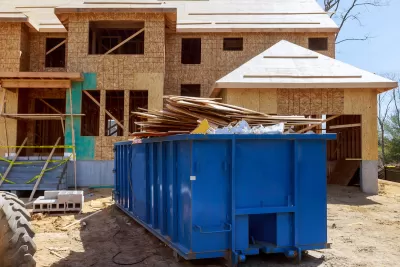Using more recycled materials could dramatically reduce carbon emissions and waste from construction projects.

A new report assesses how the construction industry can cut its carbon emissions, which make up 11 percent of energy-related emissions globally, through a practice sometimes known as circularity, reports Helen Chandler-Wilde in Bloomberg CityLab.
The report claims that the industry could reduce emissions by almost 60 percent by using more recycled and reclaimed materials. In the United Kingdom, legislation passed earlier this year requires “commercial landlords to meet minimum energy efficiency standards to rent out property.”
The report includes details on construction waste and emissions generated in several global cities. “It concluded some 77 million tonnes of waste could be kept in the supply loop over the next decade if construction firms reused materials, worth £10.6 billion. New York has the greatest potential, with 30.6 million tonnes that could be kept in construction, worth £2.8 billion.”
FULL STORY: When Recycling Comes to the Construction Industry

Maui's Vacation Rental Debate Turns Ugly
Verbal attacks, misinformation campaigns and fistfights plague a high-stakes debate to convert thousands of vacation rentals into long-term housing.

Planetizen Federal Action Tracker
A weekly monitor of how Trump’s orders and actions are impacting planners and planning in America.

In Urban Planning, AI Prompting Could be the New Design Thinking
Creativity has long been key to great urban design. What if we see AI as our new creative partner?

Chicago’s Ghost Rails
Just beneath the surface of the modern city lie the remnants of its expansive early 20th-century streetcar system.

Baker Creek Pavilion: Blending Nature and Architecture in Knoxville
Knoxville’s urban wilderness planning initiative unveils the "Baker Creek Pavilion" to increase the city's access to green spaces.

Pedestrian Deaths Drop, Remain Twice as High as in 2009
Fatalities declined by 4 percent in 2024, but the U.S. is still nowhere close to ‘Vision Zero.’
Urban Design for Planners 1: Software Tools
This six-course series explores essential urban design concepts using open source software and equips planners with the tools they need to participate fully in the urban design process.
Planning for Universal Design
Learn the tools for implementing Universal Design in planning regulations.
planning NEXT
Appalachian Highlands Housing Partners
Mpact (founded as Rail~Volution)
City of Camden Redevelopment Agency
City of Astoria
City of Portland
City of Laramie





























